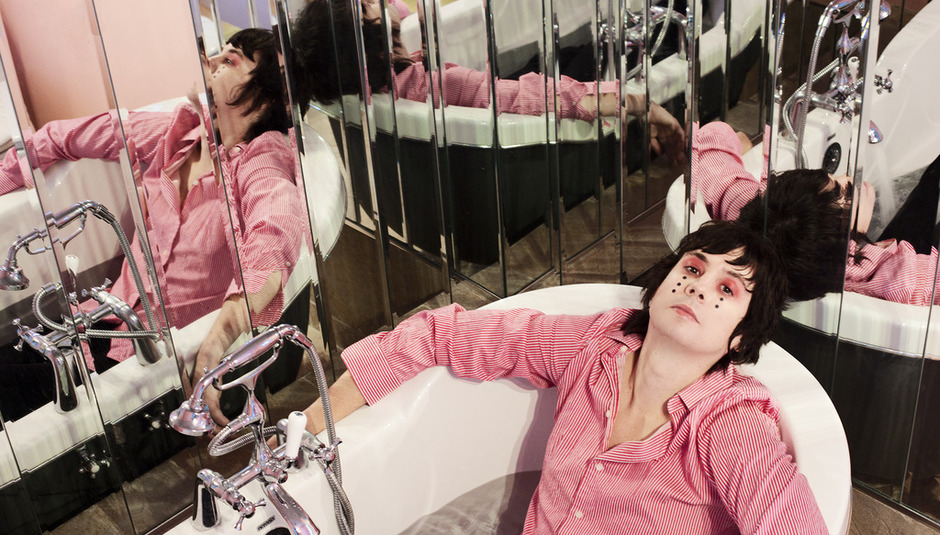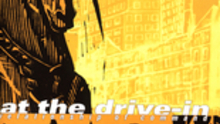In part one of my 90-minute chat with Johnny Jewel, we were just warming up. There we were, sat in a bland hotel lobby, quaffing back instant coffee and chatting about the power of music, torture and EDM... Johnny seemed to get a little more comfortable chatting with me, and I kept thinking 'my allotted time is up, yet I've only really touched on about three of the 52 things I wanted to ask'. Thankfully, the man behind Chromatics, Glass Candy, Desire, etc and the Italians Do It Better label was in the mood to talk about textures, tones, time, soldering synths and Justice - not too sure why the latter became a recurring reference point, but then as a theme, they made far more sense than the pair of us reeling off a hundred acts and disappearing on needless diversions. Strangely, this clarity and minimal distraction kept the conversation flowing, in a similar way to much of Johnny's compositions. Anyway, enough of me, back to the chat...
Sean, Drownedinsound: I think there was a big problem when artists got tied to MySpace. It was such a big thing and a lot of journalists now who are in their mid-20s are really embarrassed by the fact that they used to have a MySpace…
Johnny Jewel: MySpace was great for bands. I never had a personal MySpace page, I don’t have a personal Facebook page either. I’m not really a social networker in that way but for bands MySpace was so futuristic and so proletariat and really levelled the playing field. I can imagine if you’re 25 now and you can remember when you had a super pimped-out MySpace page and you thought you were so awesome. I can imagine that being something you’d want to forget…
And you’d have a Justice track playing on it…I wonder if that’s one of the reasons certain bands and genres are in decline…when I was chatting with Uffie I felt really sorry for her, she hadn’t done anything wrong or different, she’d just gone away and had a kid. There was something hideous about the blogger backlash and the harsh reaction from younger journalists. I mean, seemingly a lot of people championing music can’t survive over 30, so it’s just these young kids controlling the agenda and they’ve not really got the depth of knowledge or the understanding or the interest in the bigger picture or the long-term history of music. Every band they’d heard five years ago doesn’t exist anymore.
Yeah, I know, I’m very aware of this pattern and that’s why I’m so careful and aggressive of the incubation process. The only reason that we’re having this conversation is that I just love to record and that’s the whole reason that anyone ever found out about us in the first place. I saw the writing on the wall in 2007-8 when we really crashed through and this whole movement started snowballing. It’s crazy because we used to be made fun of by the indie press for being electronic and now all indie bands are electronic.
Yet, you’ve got guitar on the cover of record and the record opening with a Neil Young track...
Exactly. That’s the message that rock ‘n’ roll never died and now everyone is a producer. Used to be that the indie world was at odds with the idea of a producer, it was like this industry father figure that was controlling the band. Now everyone has such tasteful drum samples.
Kind of ironic that this [Lady Gaga’s Paparazzi in the background] is playing now…
Yeah, I know. It’s perfect. Electronic music now…I love computers and I use computers but I feel like mood has replaced songwriting for a lot of things. Everything is mood based, production-based. Production in general has made everything so easy. Even if it’s a shitty band, the chances are that they are produced decently compared to something five years ago. Everybody is aware of a 303, 808 and 909, whereas before it was just dance music people, for the most part.
It’s what those kids who once stood outside a guitar shop dribbling are doing now…
Yeah, and now they are drooling over electronics and modular synths that they don’t know how to use. Which is all cool but something’s been lost in the songwriting. For me, especially running a label which is so mood-based and I’m a major contributor to the downfall of songwriting in a sense…because we were part of a movement that really inspired people to put their guitars down and pick up a keyboard and a microphone and just abstract. The core of our stuff was that there was also substance or meat. So I saw the challenge right away, when we do another record we have to come back really, really strong and the way we have to do that is the live show and the album have to be really full of songwriting. To me the guitar represents the primitive American idea of rock ‘n’ roll and obviously we’re really electronic, even more electronic than on Night Drive and the image of the guitar really says something. It’s unfortunate for bands because they get swept up into this game of keeping up with production or gear and fetishizing a certain aesthetic. You have these young artists who have a really good idea, they have to have a spark and talent , but then immediately they just get thrown into this machine. They willingly sign up for it but they don’t really know what they are signing up for. So many bands now have a manager before they even play a show…
Most of them have lawyers too…
Yeah, it’s ridiculous. We just got a lawyer, this year, it’s the first time since 1999 we’ve ever needed one. It was just for films because Hollywood is a pretty silly place and we had to do it. We just got a manager six months ago for the first time ever because I am tired of doing everything myself. I like the work but it’s just becoming...there’s only so many hours in a day. When I’m on the road I can’t be in the studio and I can’t be on e-mail constantly…I run the label, I deal with the pressing plants, I deal with the distributors…you know what I’m saying?
Yeah, I’ve run a label too so I know…
OK, imagine being on the road in three different bands, producing for six and then dealing with other artists that you’re working with.
You need time and attention in relationships, especially creative ones and business ones…
Yeah and we’re a really close family and we work really slowly. Add all that up and it’s just like, how are you ever gonna go on tour. I like playing shows but touring is for people that want to hear the music. For me it’s all about the studio and tour is for the fans.
I imagine that currently it’s not even that lucrative, but I guess it’s not like if you weren’t on tour you wouldn’t be able to pay the rent…
Actually, we do well. We’re really lucky and we’re so efficient because we don’t have a crew. That’s another thing, you see bands where the crew is twice the size of the band and then they have a tour manager, then they have their tour foot-rubber and all the stuff. Everything is being spent on tour support but they don’t realise it’s all coming out of their royalties that they’re not making anyway.
I’m not sure if it’s true, but I thought it was funny that Lana Del Rey had a stylist on her first tour but not a sound man…
Oh yeah?! I didn’t know that!
In terms of some of the sounds on stage are you controlling the front of house sound on stage? Or do you have someone…
We travel with front of house and he’s a great guy, a French guy from Montreal. We have [and control] three mixers on stage and then we have some DI Boxes, so it’s a combination of those going direct to the house. Everything is also splitting to the stage. A lot of electronic acts have no acoustic volume... For me, seeing so many rock shows, I know that all the kids are all at the front, but the energy moves back. The kids in front of me hear the punch, if all of your sound is coming from house because you’re using a coming off a computer there’s nothing on stage. So all the people in front are excited to see you but they are not getting that kick. We have a really loud acoustic volume on stage and that is carefully mixed with the house and that’s what makes that – other than using really, really heavy analogue stuff – full, rounded and three dimensional tone that a lot of bands I see are lacking, unless I see a jazz band or rock band. Jazz bands have the best sound, it’s crazy…they all mix themselves just by how they play because they’re so good at playing. The finesse is crazy, so we try to do that with our own volumes on stage. When parts kick in we jump our volume slightly and the keyboards I use are all monophonic and from the 70s, they’re not touch-sensitive so we have to use volume and sustain as…almost like when you hit a guitar harder…what happens when you hit a guitar harder? The note resonates longer. OK, well I need to make my note trail more if I want this part to pick up some. Just thinking about those kind of concepts.
We’ve actually got a column on the site and we had Gotye talking about the organs he was using making his record and we had Apparat Organ Quartet talking about the synths they’d found. Sometimes it was about where they’d found the gear and others was the…not completely Layman’s guide to the instruments. I noticed as you were walking off stage the other night the three musician friends I was with all walked up and were trying to work out the gear…
There’s no way they’re gonna figure it out…
I know there’s a secret and some stuff you wouldn’t want to say but…
Another key thing that is unfortunate for your friends is that every single piece of equipment we use has been modified so really what you see is a shell and inside is what counts. The keyboard I use live is not anything to be envied but it’s been modified specifically for the way that I play, because I don’t know how to play. Then it has Soviet oscillators inside and there’s a Egorian repair man in Montreal who is like 70. I just say “this is what I want” and he’s really into trying to figure out how to do it, because he just repairs guitars and accordions and stuff. I’m not a scientist, I have ideas…I love to drive but I don’t know what’s under the hood, I don’t care. I don’t get into the whole mad scientist part of synth fetishism… I’m like a designer, I’m really into tone, but I don’t care about the nuts and bolts…
I wasn’t thinking this conversation would go here, but now I’m picturing you soldering in a neon-lit lab, although I know you probably don’t do it yourself…
Yeah, I go in and say “this is what I want”. Or, “I want this thing, but it doesn’t go far enough in this direction”…like, for example, a lot of the old keyboards, there’s a knob and you can do the frequency…there’s filters and LFOs and ring modulators where you can open the sound where it goes from dry to really wet or buzzy or long decay. But then once you hit the limit that’s it. So I’ll say something like “I’ll want to go further” or “I want to go into the negative” and then he’ll calibrate my electronics so that things can be scaled back really extremely. Under the keyboard there’s more room it’s just that the knob hits a certain point where it won’t go any further but if you just shift the room where it’s turning…so I do things like that.
I think that’s something that comes from experience. A lot of what happens within your records which seems to filter through every element of the keyboards interfacing with the music. It seems like you’ve really taken time to consider and explore everything…I guess my question is: how do you afford the luxury of that time?
I take it. I’m defiant, 100%. I have such a negative attitude towards the music industry because I feel like an out-of-hours artist. Just like anything - sports or modelling, say - this industry is built on killing yourself and sacrificial lambs. You don’t have anything without the artists and the artists are the ones who get screwed…we’re just like slaves or whatever. We’re treated like that, so I just don’t allow ourselves to be treated like that. I don’t allow ourselves to be pressure and it’s a really dangerous, risky thing to just be like “no, we’re not going to rush and we’re not going to leak the album and no-one’s gonna get it before anyone else and fuck you…” y’know? If that means you don’t book us, then don’t book us. I don’t wanna leave my house! I’d rather stay at home, drink tea and play with my daughter and write music. You can only pressure someone when you have something they want. The music world has nothing I want. I don’t care if I’m in print, I don’t care if I’m on tour…I don’t do drugs, I don’t play with groupies. None of the things that are luring some people, I don’t care about. For me, it’s just about the music and I want to have freedom with the music. There’s no real external pressure.
Do you feel like you put enough pressure on yourself in terms of you know what your output goal is? The end goal is to make a great record; I don’t quite see what your goal might be beyond that or if you have one? If that makes sense…
Yeah, a lasting record, that’s the ultimate goal…
Greatness in its essence…
Sometimes it’s not. Sometimes a great record is temporary. I find that in pop culture that the best records are the most disposable…not trash but…like the first Justice album is not disposable. It’s not a great record all the way through but the strong moments are incredibly strong and the less strong moments are still really good.
It’s the less strong moments which are the bigger, pop moments on the record and they’re not the most interesting moments.
Right. That album is…I don’t feel like it’s collected dust, personally as a producer.
They’ve just paid for this record [Björk] to come on…
Yeah, I know. The radio here is really interesting. Yesterday it was all Boz Scaggs and Spencer Davis Group, Steve Winwood.
Sorry, Björk is always going to be a distraction…
With the Justice record, though it was just omnipresent. It was…whether it’s rap or dance, whenever you have a record that is really current sounding it’s also going to be really dated sounding. Generally it can go way further than a Chromatics record initially…it can be really, really big then it falls really fast. I think you can have a great record that doesn’t last and you can have a great record that lasts. For me – because I don’t think I’ll be able to make a really current sounding record – I focus on the lasting record. I’m really proud to say that all of my records still sound good and still sound fresh, which is really an achievement, especially in this day and age when things are being recycled, regurgitated and destroyed so fast. It has to do with process and equipment is all really unique and taking your time to know when it’s done and be willing to wait when you know it’s not finished. I think there’re so many good bands that just…I mean…if you’re a band manager you don’t really care about someone’s career you just care about that hot moment then you move onto another band. Same with a publicist or a label, because you’re in the back end of the industry where there’s always a crop of new artists coming up…
There’s always another band that might sign a major label hit…
Right.
But whether they actually sell any records or not is by the by…
Right, because you get your buy out or you make your percentage…it’s unfortunate but I never signed with anyone and I would suggest that all young artists make their way first. We never came to Europe before it could pay for itself. The whole philosophy at the time was that we don’t have a credit card we only have a debit card, so there’s no credit line and we only pay for what we have. If we can’t afford to press a record we wait and we never over extend ourselves. It’s a really important call to all the groups. Because of that there are natural checks and balances that a touring band would have had in the 80s where you’re not on this huge stage before you’re ready because you’ve already had to go through this entire obstacle course to get there. It’s something that no-one understands now so you have these bands in insane situations. You see it a lot with hip-hop artists as well because the studio or conceptual electronic projects…and all of a sudden the music is so good that all these people want to see it and this is like an artist who has never played a show before. Then all of a sudden everyone’s watching. Then they have this weird expectation of what everything’s gonna be like, which obviously has nothing to do with the music.
In part three, the cleaning lady started hoovering, and this assault of noise dovetailed in neatly to chatting about the influence of Thurston Moore and Ian Mackaye on Italians Do it Better - who are about to release the second After Dark compilation, and Mr Jewel popped up a remastered version of the first one on Soundcloud...























